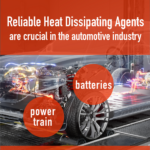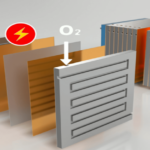
The Role of the Adhesives Industry in America's Transition to Electric Vehicles
In countries all over the world, including the United States, the auto manufacturing industry is spending significant resources to make the transition from internal combustion engines (ICEs) to battery electric vehicles (EVs). It is estimated that by 2025 electric vehicles will hit 10% of global passenger vehicle sales and jumping forward to 2040, it is predicted that EVs will account for 58% of all car sales. This will be the first time in history electric vehicles will surpass traditional vehicle sales.
The shift to electric vehicles is being propelled by the need to cut greenhouse gas emissions to avoid the most catastrophic outcomes of climate change. Through the support of the adhesives industry, auto manufacturers can create competitive supply chains to support the growth of EVs and be at the forefront of these important technological advancements.
Adhesives manufacturers are seeing a positive impact on their industry as auto manufacturing looks toward the future as adhesives, sealants, and gaskets play pivotal roles in several key areas of EV production, including:
By gaining a more thorough understanding of the critical role adhesives, sealants and gaskets play in the high expectations of the automotive industry, manufacturers can find a partner to support their goals.
UNDERSTANDING THE USE OF ADHESIVES, GASKETS AND SEALANTS IN EV BATTERIES
Industrial Market Insight estimates that the average electric vehicle utilizes nearly eight pounds of adhesives and sealants between the battery and the motor. Even hybrid electric vehicles use nearly two pounds of adhesives between the battery and the motor. It is clear that the opportunity for the adhesives industry to make an impact on electric vehicle manufacturing is real and the time is now.
While battery technology in the automotive manufacturing industry has been adapted from consumer electronics, the requirements are much more stringent as battery makers must achieve a 12–15-year vehicle life. When it comes to hybrid electric vehicles (HEVs) and battery electric vehicles (BEVs), adhesives and sealants are playing a critical role in extending the life of battery cells, modules, packs, and motors.
According to Adhesives.org, the most important benefits adhesives and sealants provide to EV powertrains are:
UNDERSTANDING THE USE OF ADHESIVES, GASKETS, AND SEALANTS IN EV ELECTRONIC CONTROL UNITS
By 2027, the automotive electronic control unit (ECU) market is projected to hit $84 Billion in the US. This increase in demand will only further drive the need for quality adhesive, sealant, and gasket solutions for the EV market.
The ECU market demands products that are designed to handle the high capacity and high-performance expectations of automotive electronics. Heat dissipation, electrical conduiting, case sealing, connector potting, and protective coatings are all important technologies being developed by frontrunners in the adhesives industry.
More recently, the demand for vehicles that are environmentally friendly and multifunctional has grown. In an effort to support these needs within the auto manufacturing industry, a number of electrical components and ECUs have been used more often. Since ECUs are being installed in more severe environments, the need for higher quality and reliable adhesives and sealing agents are becoming more prevalent.
On EVs, the converter, inverter, and controller are all typically integrated into one unit. The inverter/converter supplies a current to the battery pack for recharging purposes and provides valuable electricity to the motor/generator. Proper cooling and ventilation are critical to keeping these components operational within electric vehicles.
Since inverters and converters are comprised of numerous electrical components, a variety of high-quality sealants, adhesives, and gaskets are used. As the future moves toward modules that are smaller, more functional, and higher performing, the adhesives industry is also shifting in that direction. By offering adhesive technology with more functionality, including potting agents, flame-resistant options, and heat radiating agents, the industry can grow alongside the global power converter/inverter market.
As the industry continues to innovate, the market valuation goes up. In 2021, the global power converter/inverter market is valued at 194.9 million in the U.S and is expected to reach 292.4 million USD by the end of 2026.
The Future is Looking Bright for the American Adhesives Industry Demand drives development. And with the BNEF predicting that 500 million passenger EVs will be on the road around the world by 2040, now is the time to invest in adhesive innovations that support your auto manufacturing goals and help propel the electronic vehicle industry forward holistically.
Auto manufacturers in the U.S. can only be competitive if they choose the right partners to advance technological growth in an effort to build high-quality EV batteries, electronic control units, and inverters/converters that meet or even exceed, industry standards. One critical component in this success will be leaning on the innovative advancements happening in the adhesives industry.
ThreeBond has been driving the future of adhesives as it applies to the automotive manufacturing industry. We offer a diverse array of products designed to handle the high capacity and high-performance expectations of automotive electronics. Producing safe and efficient adhesives, sealants, and coatings for automotive manufacturing has been a continued focus for our brand. Our innovative technologies are created to support the growth of electric vehicle manufacturers in a way that makes us a trusted and reliable partner through every step of the supply chain. Contact us to learn more about how we can collaborate with you to develop new products and formulations to meet your specifications.
The shift to electric vehicles is being propelled by the need to cut greenhouse gas emissions to avoid the most catastrophic outcomes of climate change. Through the support of the adhesives industry, auto manufacturers can create competitive supply chains to support the growth of EVs and be at the forefront of these important technological advancements.
Adhesives manufacturers are seeing a positive impact on their industry as auto manufacturing looks toward the future as adhesives, sealants, and gaskets play pivotal roles in several key areas of EV production, including:
- EV Batteries
- Electronic Control Units
- Inverters/Converters
By gaining a more thorough understanding of the critical role adhesives, sealants and gaskets play in the high expectations of the automotive industry, manufacturers can find a partner to support their goals.
UNDERSTANDING THE USE OF ADHESIVES, GASKETS AND SEALANTS IN EV BATTERIES
Industrial Market Insight estimates that the average electric vehicle utilizes nearly eight pounds of adhesives and sealants between the battery and the motor. Even hybrid electric vehicles use nearly two pounds of adhesives between the battery and the motor. It is clear that the opportunity for the adhesives industry to make an impact on electric vehicle manufacturing is real and the time is now.
While battery technology in the automotive manufacturing industry has been adapted from consumer electronics, the requirements are much more stringent as battery makers must achieve a 12–15-year vehicle life. When it comes to hybrid electric vehicles (HEVs) and battery electric vehicles (BEVs), adhesives and sealants are playing a critical role in extending the life of battery cells, modules, packs, and motors.
According to Adhesives.org, the most important benefits adhesives and sealants provide to EV powertrains are:
- Joining components while also shielding them from shock and vibration
- Isolating components from shock and vibration while also creating a pathway for heat to move away from the cells and modules
- Conducting thermal energy to cool battery cells and modules, but still electrically isolating them to avoid shorts and prevent fires
UNDERSTANDING THE USE OF ADHESIVES, GASKETS, AND SEALANTS IN EV ELECTRONIC CONTROL UNITS
By 2027, the automotive electronic control unit (ECU) market is projected to hit $84 Billion in the US. This increase in demand will only further drive the need for quality adhesive, sealant, and gasket solutions for the EV market.
The ECU market demands products that are designed to handle the high capacity and high-performance expectations of automotive electronics. Heat dissipation, electrical conduiting, case sealing, connector potting, and protective coatings are all important technologies being developed by frontrunners in the adhesives industry.
More recently, the demand for vehicles that are environmentally friendly and multifunctional has grown. In an effort to support these needs within the auto manufacturing industry, a number of electrical components and ECUs have been used more often. Since ECUs are being installed in more severe environments, the need for higher quality and reliable adhesives and sealing agents are becoming more prevalent.
UNDERSTANDING THE USE OF ADHESIVES, GASKETS, AND SEALANTS IN INVERTERS AND CONVERTERS
On EVs, the converter, inverter, and controller are all typically integrated into one unit. The inverter/converter supplies a current to the battery pack for recharging purposes and provides valuable electricity to the motor/generator. Proper cooling and ventilation are critical to keeping these components operational within electric vehicles.
Since inverters and converters are comprised of numerous electrical components, a variety of high-quality sealants, adhesives, and gaskets are used. As the future moves toward modules that are smaller, more functional, and higher performing, the adhesives industry is also shifting in that direction. By offering adhesive technology with more functionality, including potting agents, flame-resistant options, and heat radiating agents, the industry can grow alongside the global power converter/inverter market.
As the industry continues to innovate, the market valuation goes up. In 2021, the global power converter/inverter market is valued at 194.9 million in the U.S and is expected to reach 292.4 million USD by the end of 2026.
The Future is Looking Bright for the American Adhesives Industry Demand drives development. And with the BNEF predicting that 500 million passenger EVs will be on the road around the world by 2040, now is the time to invest in adhesive innovations that support your auto manufacturing goals and help propel the electronic vehicle industry forward holistically.
Auto manufacturers in the U.S. can only be competitive if they choose the right partners to advance technological growth in an effort to build high-quality EV batteries, electronic control units, and inverters/converters that meet or even exceed, industry standards. One critical component in this success will be leaning on the innovative advancements happening in the adhesives industry.
ABOUT THREEBOND INTERNATIONAL
ThreeBond has been driving the future of adhesives as it applies to the automotive manufacturing industry. We offer a diverse array of products designed to handle the high capacity and high-performance expectations of automotive electronics. Producing safe and efficient adhesives, sealants, and coatings for automotive manufacturing has been a continued focus for our brand. Our innovative technologies are created to support the growth of electric vehicle manufacturers in a way that makes us a trusted and reliable partner through every step of the supply chain. Contact us to learn more about how we can collaborate with you to develop new products and formulations to meet your specifications.




